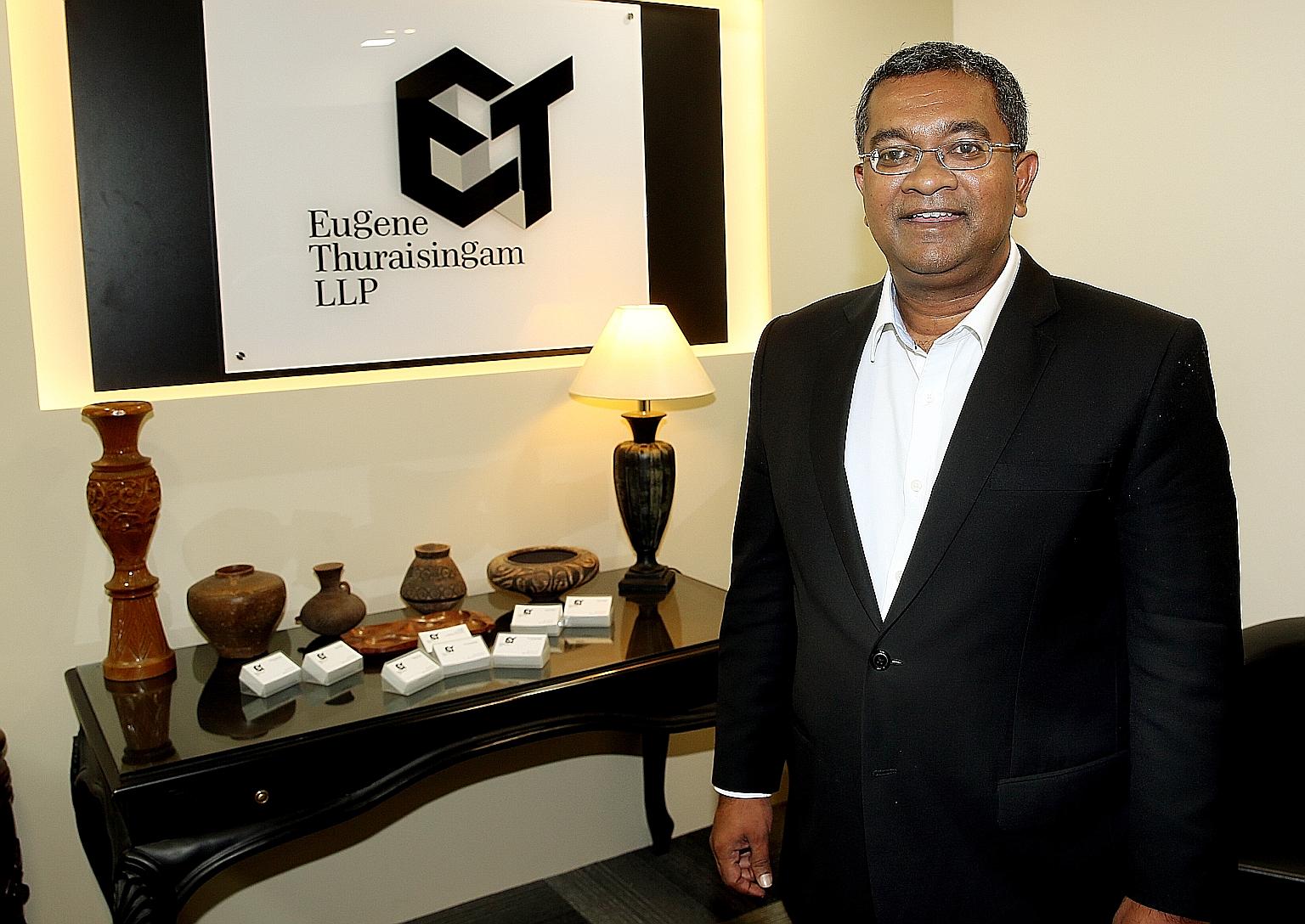People
Lawyer Eugene Thuraisingam defends people who might face the death penalty
Lawyer has for 12 years defended pro bono poor accused who might face death penalty
Sign up now: Get ST's newsletters delivered to your inbox

Mr Thuraisingam is one of about 200 lawyers on the Legal Assistance Scheme for Capital Offences.
ST PHOTO: LAU FOOK KONG
Seow Bei Yi
Follow topic:
Criminal cases may form just a fraction of work that lawyer Eugene Thuraisingam handles, but they hold a special place in his heart.
"When I was young... I used to enjoy reading about criminal cases (in the newspapers). That's when my interest in law started," said the 41-year-old. He counts his former boss, the late Senior Counsel R. Palakrishnan who ran a law firm focusing on criminal cases, among his sources of inspiration.
For the past 12 years, Mr Thuraisingam has been defending accused people who might face the death penalty, on a pro bono basis under the Legal Assistance Scheme for Capital Offences (Lasco).
"Most of them are nice, young, naive and unfortunately, because they are the poorest of the poor, they don't have the skills set or opportunity to earn money," he said of his clients, some of whom were drug couriers or traffickers.
"And so, they fall prey to these quick ways to make a few dollars.
"You can't help but sympathise with the predicament they're in," he added. "There is nobody else to help them; if you don't help, who else can they turn to?"
One of them was Dinesh Pillai, then 26, the first drug convict to be saved from the gallows due to his mental condition.
The Malaysian had been tasked to bring a "packet of food" across the Causeway for RM200 seven years ago. The pack, wrapped in brown paper and bagged with packets of chilli and gravy, was later found to contain 19.35g of heroin.
Dinesh was given the mandatory death penalty and Mr Thuraisingam was assigned to the man's appeal. It was among the lawyer's first few criminal cases in the Court of Appeal and is one of his most memorable to date.
Their first two appeals were unsuccessful, said Mr Thuraisingam, who added: "It was depressing ."
The turning point came when the Misuse of Drugs Act was amended during that period. In gist, the change gave the judges presiding over drug cases more leeway in sentencing. If the offender showed he was a mere courier and either cooperated with the authorities or suffered from a mental disorder, a High Court judge could sentence him to life in prison and not the mandatory death penalty.
Dinesh was sent for psychiatric assessment and it was found that he was likely suffering from depression and his mental state was adjudged significant in his agreement to transport the drugs. The lawyer successfully applied for a re-sentencing and Dinesh was given life imprisonment instead.
"While he does have to serve a very long period of time in jail, at least a life was saved," said Mr Thuraisingam, who is against the death penalty.
"It is stressful, but I think if you want to do a good job for your client, you've got to put stress aside, you've got to put emotions aside," he said about representing those charged with capital offences.
There are some 200 lawyers on Lasco, which ensures that people facing capital charges in the High Court have legal representation.
While he has saved many from the gallows, the consequences are devastating when he is unsuccessful, he said - he has lost one appeal.
Drug syndicate leader Quek Hock Lye, whose attempts to swop his death sentence for a prison term were unsuccessful, was hanged earlier this year. The 50-year-old was sentenced in 2010 for trafficking in more than 60g of heroin.
"You feel sad because a life was lost, but I know I did everything possible," said Mr Thuraisingam.
"You don't get too emotional after a while and you learn that all you can do is to do your best."

